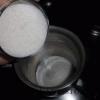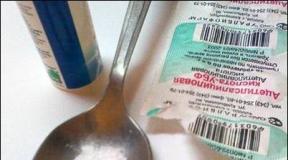What does low blood potassium mean? Low potassium in the blood: the main causes and danger of hypokalemia. False reasons for the increase
The materials are published for review and are not a prescription for treatment! We recommend that you contact a hematologist at your healthcare facility!
Hypokalemia (low potassium in the blood) is a very unpleasant disease. Potassium is an essential element found in human cells. At least 2% of potassium enters the bloodstream, and the slightest decrease in its level negatively affects health. Symptoms of hypokalemia range from fatigue to paralysis of the lungs.
Symptomatic manifestations
Symptoms of hypokalemia in humans depend on the severity of the disease. The kidneys should excrete 70 to 100 mmol of this substance daily. If for some reason more of it is excreted, then a person has a reduced composition of potassium. Cardiac arrhythmias, paresthesias, collapse, bradycardia, rhabdomyolysis, muscle pain and spasms, constipation, paralysis of the lungs, numbness of the limbs, vomiting, and bloating are all symptoms of hypokalemia. Patients are also found frequent urination and thirst.

Pain in the abdomen, accompanied by arrhythmia and poor health - common symptoms of hypokalemia
Important: If a slight decrease in the concentration of potassium in the blood is detected, then the listed symptoms may not appear, and if there is a significant shortage, then this is a health threat.
Hypokalemia can cause kidney diabetes (diabetes insipidus). Also, epidemiological studies have shown that there is a link between a deficient intake of potassium along with food and hypertension in residents of African countries. Taking potassium-containing drugs lowers blood pressure. Set the cause high blood pressure with hypokalemia has not yet succeeded.
The main symptom of this disorder is a high loss of potassium, which is determined by testing. Many syndromes develop - numbness, goosebumps, tingling, weakness, apathy, long sleep, heart rhythm disturbances, arrhythmia, pronounced nausea, vomiting.
Common Causes
Doctors have established the causes of hypokalemia. The most common are:
- taking diuretics;
- diarrhea;
- excessive use of laxatives;
- sweating;
- vomiting syndrome;
- passion for enemas and drugs that treat asthma, emphysema (theophylline);
- steroids;
- leukemia;
- kidney disorders;
- taking insulin;
- bulimia;
- alkalosis;
- passion for licorice, tobacco;
- malnutrition;
- intestinal obstruction;
- extensive burns;
- alcoholism;
- diabetes;
- tumor growth.
Diagnosis of the disease
First, they find out if the patient has used laxatives or diuretics, if he is fond of inducing artificial vomiting. Exclude the use of potassium in food. The loss of potassium is established by examining the urine. If the kidneys work well, then with a decrease in secretion and an increase in potassium absorption, its excretion drops to 15 mmol per day.

Important: Blood donation for the rate of potassium, creatinine, urea nitrogen, glucose, sodium, phosphorus, thyroxine, mineralocorticoids in plasma is a mandatory diagnostic procedure.
Hypokalemia is detected on the ECG when the concentration of potassium exceeds 7 mmol / l. With an increase in the level of this element in the serum, high T-waves are found on the ECG. Changes in the electrocardiogram are clearly pronounced with hypokalemia (low potassium in the blood) accompanied by hypocalcemia, hypomagnesemia.
How to treat hypokalemia
With a serious decrease in potassium, the patient requires intensive treatment of hypokalemia. It includes balancing the balance with the help of drug treatment. Drugs are prescribed depending on the root cause that caused hypokalemia, since this pathology often occurs as a result of disorders in the body caused by a disease.
Fortifying agents are prescribed to maintain the body: asparkam, panangin. Violation of the acid state is treated with potassium chloride. Acid and alkaline balance normalized with bicarbonate and potassium citrate. In addition to oral treatment of hypokalemia ( reduced content potassium in the blood) parenteral therapy is used. Control of the content of potassium in the blood is provided when taking digoxin, triamterene, spironolactone. There are a lot of similar drugs for hypokalemia, but they cause temporary bleeding and are prescribed in small doses.
Diet and nutrition
The diet for hypokalemia should contain potassium and foods that promote its absorption. You can’t prescribe a diet for yourself, it’s better to consult a doctor.
This is the main intracellular ion, the importance of which is difficult to overestimate. Any electrical activity of the cell of each organ depends entirely on this element of the periodic system of our great compatriot. If the amount of this substance goes beyond the physiological limits, then the kidneys, heart, and central nervous system are starting to falter.
What kind of pathological processes start in the human body in the presence of reduced level in the blood, and most importantly - how to prevent their appearance? To answer this question in one word - it is not possible, but be patient, dear reader, and you will be sufficiently informed. So, first things first.
The role of potassium in the body
As I already mentioned, potassium is the main intracellular electrolyte that regulates the electrical activity of any organ. Such organs of our body as the heart, the central nervous system, are directly dependent on the amount of this element.
With a decrease in the concentration of potassium, normal cardiac activity becomes impossible. There are interruptions in the pulse rate, as well as a number of much more formidable manifestations.
Most of the sources of potassium are plant foods. Such diverse products as: legumes, potatoes, soybeans contain this element in very significant quantities. True, there is one problem, humanity is increasingly resorting to the use of animal products containing mainly sodium.
I note that the amount of potassium directly depends on the content of sodium - the main antagonist of this element. The higher the amount of the first, the lower the percentage of the second. As a result of the dominance of animal products on our tables, the preponderance smoothly fits into the side, so to speak, of the “enemy” of the element I am considering.
What leads to potassium deficiency?
The first reason that changes the electrolyte balance of the blood has already been identified by me - an overabundance of animal food containing a large amount of sodium. But, nevertheless, the list of provocative factors does not end there. Here are just a few of them.
Diseases associated with dysfunction endocrine system. In particular, with such a pathology as Itsenko-Kushink syndrome, an excess amount of adrenal hormones is released into the human blood. In addition to other manifestations, which, by the way, are very specific, the level of potassium in the plasma also decreases, which means that patients cannot avoid troubles from the cardiovascular system.
Kidney pathology, leading to excessive loss or vice versa, fluid retention, can also cause electrolyte imbalance. True, in this case, as in the previous one, it is secondary. With adequate correction of the primary pathology, the problem with the amount of data element can be solved by itself.
The problem of cleanliness of the intestines in last years excites the minds of many of us. What is just not promoted by supposedly experts - from destructive enemas with soapy water, to the use of laxatives and diuretics. The harm from such manipulations is incredibly multifaceted. Among other complications, there is a place and a problem with the amount of potassium.
In addition to the above reasons, electrolytes are also affected by factors such as an unbalanced, uncontrolled diet, bulimia, anorexia, pregnancy, alcoholism, chronic stress, gastrointestinal surgery, and a number of other conditions.
Manifestation of potassium deficiency
First of all, general symptoms should be noted. This is about the following manifestations potassium deficiency is weakness, increased fatigue during physical exertion, irritability, lethargy, apathy, depression, and so on. Given the pronounced stress component of the life of every modern person, it can be stated with confidence that such signs can be found in every second person.
Violations of electrical activity will certainly affect the work of the heart muscle - myocardium. Most often, this is expressed in the appearance of sharp, unexpected heartbeats, or even a whole series of them, occurring both at rest and during exercise. I note that this is a very formidable manifestation, requiring the immediate intervention of a cardiologist. This symptom should not be underestimated.
Frequent and profuse urination can be a manifestation of potassium deficiency. In addition, this starts a vicious cycle, the more fluid is lost, the lower the electrolyte content in the blood and further in a circle.
Violations in the innervation of the skeletal muscles can manifest themselves in the form of periodic cramps and tingling in the muscles. There may be a feeling of some numbness, expressed in a decrease in skin sensitivity.
In most cases, there are problems with the intestines. Frequent constipation, alternating with loose stools. Rumbling in the stomach, bloating, increased gas formation and a host of other symptoms.
Potassium Correction
Of course, when the above symptoms appear, you should seek qualified help. If there are no diseases in the body that can cause a reduced level of potassium, the diet should be changed by reducing the amount of animal and increasing the content of plant foods.
Eat more potatoes, especially young ones, which can be eaten right with the skin, bake them. I note that the maximum amount of potassium is contained in its outer shell.
Cut down on your intake table salt but don't give it up completely. Otherwise, you will have to adjust the level of sodium, which, although it is a potassium antagonist, is nevertheless necessary for a person.
Conclusion
Proper nutrition, attention to your health, plus an active lifestyle, is the key to youth and longevity.
Potassium is one of the important elements that make up the human cell. It is present in the body in a cationic form, participating in water-salt metabolism, the processes of muscle tissue contraction, nervous activity and maintaining homeostasis.
The vast majority of potassium cations are present in the cells of skeletal muscles and bones. About two percent is found in blood plasma.
Potassium in the blood can be both low and high. Low level called "hypokalemia", high - "". Let us dwell in more detail on the state when the potassium content in the body is below normal.
The causes of this disease are very different.
A specific diet that is low in potassium-rich foods can lead to a decrease in the concentration of this cation in the body. Many choose such a diet unconsciously, in an attempt to lose those extra pounds. A decrease in the level of an ion in the blood below normal can subsequently develop into dangerous pathologies. It should be noted that hypokalemia caused by an unbalanced diet does not require treatment, as it is not associated with impaired functioning of internal organs. It is enough to review the diet and develop a diet for yourself from foods rich in potassium. In case of difficulty, it is recommended to contact a nutritionist, he will develop proper diet, which normalizes potassium and will not allow you to go into hyperkalemia.
Some non-pathological conditions increase the body's need for potassium, causing its accelerated processing and, accordingly, deficiency. Hypokalemia is characteristic of conditions such as pregnancy, the postpartum period, and surgery.
One of the rather rare causes is geophagia. This eating disorder is characterized by a desire to eat clay and is noted in some children, pregnant women. Clay interacts in the body with potassium and iron cations, making it difficult to utilize them in the gastrointestinal tract.
Hypokalemia develops in some pathologies of the endocrine system (Itsengo-Cushing's syndrome, Conn's syndrome, aldosteronism). At the same time, an increased outflow of potassium ions from the body with urine and a drop in the concentration of the cation in the blood are noted.
Hypokalemia is observed in patients with diseases thyroid gland(for example, thyrotoxicosis).
Diseases of the excretory system can be caused by difficulties in the absorption of potassium ions ( diabetes, acidosis, Fanconi syndrome).
Significant physical activity or other causes of profuse sweating contribute to excessive excretion of salts from the body (sometimes prescribed for hyperkalemia).Diseases of the gastrointestinal tract or taking laxatives contribute to increased excretion of potassium.
Taking medicines and drugs in the treatment of other diseases or with the wrong dosage can lead to a decrease in the concentration of potassium in the blood plasma below the reference values.
Symptoms and signs of hypokalemia
Hypokalemia on early stages has similar symptoms to hyperkalemia:
- fatigue, reduced work capacity;
- tremor, muscle weakness, pain;
- pulse below normal
- often too strong urine output (up to three liters per day).
The aggravation of the disease leads to the appearance of new symptoms other than hyperkalemia:
- the greater the decrease in potassium in the blood, the lower the functioning of the kidneys;
- anuria (lack of urine);
- digestive disorders (vomiting, nausea, bloating, intestinal obstruction);
- paralysis;
- violation of respiratory activity;
- high blood pressure;
- hormone levels are below normal.
Treatment of hypokalemia, how to increase the concentration of potassium in the body
Before prescribing treatment, the doctor will first evaluate the nature of the disease, the causes, symptoms, medical history, and laboratory test results. The goal of therapy is not only to increase the concentration of potassium in the blood plasma, but also to eliminate the sources of the resulting pathological condition.
The first step in the treatment of this disease, as in hyperkalemia, is the appointment of a special diet, consisting of foods rich in potassium. There are many such products, so everyone can choose a menu to their taste. It is worth noting that when developing a diet, you need to know the measure, since excessive consumption of potassium-rich foods causes a significant burden on the kidneys and hyperkalemia. This deviation is dangerous and threatens a wide range possible pathologies.
Treatment of hyperkalemia in advanced cases includes surgery, transfusions and blood filtration on a special device. Therefore, it is recommended to be more restrained in the choice of food and carefully monitor the symptoms. Products in which the concentration of potassium is lower do not contribute to recovery, but they will not harm either.
High levels of potassium are found in meat products, potatoes, bananas, cereals, various types of cabbage, nuts, coffee, tea and many others.If hypokalemia has an acute character and pronounced symptoms, then it is necessary drug treatment. In this case, drugs are prescribed for treatment with great content potassium. But, when taking medications, you should be careful with the dosage. With a low severity of the disease and excessive intake of potassium-containing drugs, hypokalemia can develop into hyperkalemia. This must be avoided so that later it is not treated for another disease.
It is important to note that hyperkalemia is often treated with medication, and the goal of treatment is not only to reduce the concentration of potassium, but also to work with the source of the pathology. Since hyperkalemia in some cases can damage internal organs and body systems, then effective way therapy is only blood filtration.
The effectiveness of treatment is monitored using an ECG. With a positive dynamics of therapy, the amount of potassium consumed should be made lower.
Lack of potassium in the body (hypokalemia) is a diagnosis that doctors often make today. This problem is diagnosed even in those people who consider themselves quite healthy, especially those who wage an uncompromising fight against extra pounds by fasting, using diuretics, including “teas for weight loss” that have been common in recent years. But electrolyte disturbances, which include hypokalemia, are provoked not only by these reasons. Why does such a problem arise, what are the symptoms of hypokalemia and methods of correction?
Potassium Concentration Rates
Potassium is a very important substance involved in many biochemical processes in the human body. It plays an important role in intracellular processes, supporting the functioning of the whole organism as a whole. The main part of potassium is contained in the cells, in the intercellular substance it contains about 2 percent of the total volume in the body.
The content of potassium in the body is measured by its level in the blood, in mmol / liter. According to recent medical studies, the norm of the concentration of a substance in the blood plasma of adults should be in the range from 3.5 to 5.4 mmol / l. If the indicator is lowered and does not reach the minimum acceptable level, then this indicates the development of hypokalemia in the patient. This, in turn, causes a whole range of severe functional disorders body, especially the heart. No less harmful and too high a level.
For children, the norm is somewhat different:
- infants in the first month of life are allowed to have potassium in the blood in a volume of 3.6 to 6 mmol / liter;
- babies from a month to a year - 3.7-5.7 mmol / liter;
- in the range of 1-16 years, the norm is 3.2-5.4 mmol / liter;
- norms for potassium in whole red blood (not only in plasma) range from 79.4 to 112.6 mmol / liter.
In the process of metabolism, the excretion of potassium is carried out mainly through the kidneys, therefore, the diagnosis of the level of the substance is carried out, among other things, by urinalysis. In an adult in good health per day, the kidneys metabolize and excrete up to 4 grams of potassium per day, in children, depending on age, from 0.2 to 3.55 grams. As the child grows, the norm increases, reaching, in the end, the indicators of adults.
Why does potassium level drop?
The lack of potassium ions is caused by a number of circumstances leading to a drop in the content of potassium in cells and disruption of various processes in the human body.
The following are the main causes of hypokalemia: 
- Bad nutrition. The main source of potassium entering the body is food, and if it contains little or no substance, this will predictably lead to a potassium deficiency. An alternative cause may be reduced, due to any pathology, appetite. At first, the body manages to maintain balance by automatically reducing the excretion of potassium through the kidneys and gastrointestinal tract, but over time, the reserves of the substance in the body are depleted, and symptoms of potassium deficiency develop.
- Some conditions require an increased intake of potassium in the body. These include, for example, periods after childbirth or rehabilitation after surgery, as well as the period of bearing a child - all these conditions are among the causes of hypokalemia.
- Another cause of hypokalemia is nutritional deviations, the so-called geophagia, or eating clay. Such food deviation occurs, for example, in pregnant women, and quite often in young children, as well as in some tribes of African aborigines. Once in the gastrointestinal tract, the clay binds the ions of the substance, blocking their metabolism, the level of potassium in the body drops.
- Some endocrine dysfunctions lead to increased potassium excretion and may lower its content. These include, for example, Conn's, Itsenko-Cushing's syndromes, and others. Treatment of endocrine disorders with hormonal medications can also provoke increased potassium excretion.
- Thyrotoxicosis (thyroid disease).
- Pathologies of the excretory system, in which potassium metabolism is disturbed. They are often accompanied, for example, by diabetes mellitus, and a number of other diseases.
- Potassium is excreted not only in urine and stool, but also through sweat. If a person sweats a lot in the process physical activity and other circumstances accompanied by heavy sweating, this also contributes to a drop in its concentration in the body.
- A low level of potassium can be caused by diseases of the gastrointestinal tract, because the substance is also excreted through the intestines. This may be diarrhea of various origins, polyps, prolonged vomiting, neoplasms of the pancreas, fistulas in the intestines or stomach walls. Contributes to the loss of potassium and the use of laxatives.
- Hypokalemia may be congenital. A genetic pathology is known, leading to the fact that the level of potassium in the blood, as well as cells, periodically drops. It is manifested by muscle weakness with a low concentration of potassium.
- Various electrolyte imbalances in the body.
- The use of various medications, adrenaline, testosterone, the introduction of insulin and other means that provoke the acceleration of the withdrawal of the substance. This also includes the intake of diuretics, and the introduction into the body of a significant amount medicinal solutions that do not contain potassium.
- Uncontrolled and improper use of diuretics, leading to a sharp loss of potassium.
Symptoms of potassium deficiency
Signs of hypokalemia have several gradations and depend on the degree of drop in the content of potassium ions.
The first symptoms of deficiency manifest themselves when the concentration decreases to a level of less than 3.5 mmol / liter in plasma, and resemble those of general electrolyte imbalances:
- poor ability to work, persistent constant desire to lie down, fatigue;
- weakness and myalgia, cramps in the calves of the legs, tremor of the hands;
- slow heartbeat;
- increased urine output by the kidneys, which can reach the stage of polyuria (loss of more than 3 liters of fluid per day).
As hypokalemia progresses, the symptoms increase, the consequences of a lack of potassium become more severe: 
- the manifestation of functional disorders of the kidneys begins;
- polyuria is replaced by a complete cessation of urine excretion;
- gastrointestinal disorders begin: flatulence and bloating, loss of appetite, vomiting, impaired intestinal motility, leading to its obstruction);
- muscle paralysis;
- breathing problems (wheezing, shortness of breath);
- a decrease in the frequency of heart contractions against the background of an increase in the size of the organ, noises and heart rhythm failures. The electrocardiogram shows pathological changes;
- increase in blood pressure;
- hormonal dysfunctions.
Possible consequences
Due to this, even with a slight lack of potassium in the body, the symptoms can be very serious: 
- myalgia (pain in the muscles - they occur due to a fallen, against the background of hypokalemia, muscle tone.), cardiac arrhythmia and adynamia;
- the risk of developing diabetes, as a result of an increased load on the insulin synthesis mechanism;
- a lack of potassium affects the functioning of the kidneys, which can lead to glycoside poisoning in patients taking digitalis-based heart preparations. The metabolic products of these drugs contain glycosides, the output of which is blocked by renal failure;
- general disorders of acid-base balance;
- from the previous paragraph, a sudden cessation of cardiac activity may develop, due to far-reaching acid-base imbalance and related changes in the heart muscle. This phenomenon is called “sudden coronary death” by physicians.
Hypokalemia is accompanied by another phenomenon - hypomagnesemia, that is, magnesium deficiency. This is due to the fact that drugs from the spectrum of diuretics are washed out of the body, in addition to potassium, and other trace elements, including magnesium. And the metabolism of potassium and magnesium is closely related.
How to treat
To begin therapy for potassium deficiency, it is necessary, first of all, to determine the cause of the phenomenon.
Usually, when starting treatment for hypokalemia, doctors immediately prescribe a special diet that includes potassium-rich foods: 
- red meat;
- bananas;
- potato;
- mushrooms;
- various cereals (buckwheat, oatmeal, millet);
- legumes (peas, beans), as well as eggplant;
- various types of cabbage, including sea cabbage;
- vegetables - carrots, radishes and beets;
- potassium-rich watermelons and melons, pumpkin;
- greens (spinach, parsley, different types lettuce);
- nuts;
- dried fruits;
- fruits such as apples, avocados, apricots and peaches;
- tea, cocoa drinks and coffee.
By compiling a menu from this list, it is quite easy to increase the concentration of potassium.
In addition to the diet, with hypokalemia, treatment is carried out with medications containing potassium that is easily accessible for absorption.
Such, for example, is potassium chloride, which is administered intravenously in the form of a solution of a substance in glucose. But such a solution should be used with care - in some cases, the effect of the so-called rebound hypokalemia is possible, associated with the presence of glucose in the solution, which can cause an even more severe lack of potassium. Therefore, the treatment of hypokalemia using intravenous agents should be carried out under the strict supervision of a physician.
Oral potassium-containing medicines are safer. Today, there is a fairly large number of such products on the market: Panangin, Potassium Orotate and others that can increase the concentration of potassium. Doctors may prescribe them to patients to stabilize the level of potassium ions in the body, especially while taking diuretics.
Very varied. It contains many substances that are responsible for carrying out certain processes in the body. It is very important to maintain a constant ionic composition of the blood. After all, only in this state can cellular reactions proceed correctly. A special role among the ions belongs to potassium. The trace element ensures the normal functioning of the heart. It is involved in biochemical processes in the brain and certain organs of the digestive tract. All of these systems can fail if there is elevated potassium in the blood. The reasons for this condition require detailed study.
The role of potassium in the body
This trace element contained in the cells is responsible for many processes occurring in the body. He makes adjustments water balance, normalizes heartbeat. In addition, potassium affects the functioning of most cells, especially muscle and nerve cells.
This microelement stimulates mental clarity, helps the body get rid of toxins and toxins, improves brain oxygenation. The effect of potassium is similar to that of immunomodulators. The trace element effectively helps fight allergies and helps to lower pressure.
Thus, the role of potassium for the body is as follows:
- Regulation of acid-base balance in the blood, water balance of cellular and intercellular fluid, water-salt balance,
- Transmission of nerve impulses.
- Activation of certain enzymes, carbohydrate and protein metabolism.
- Ensuring a normal heart rhythm.
- Protein synthesis, conversion of glucose into glycogen.
- Ensuring the normalization of the kidneys (excretory function).
- Improvement of bowel activity.
- Normal pressure support.
Given all this, it is very important to understand what are hidden, if elevated potassium in the blood is diagnosed, the causes of this phenomenon. But before understanding the sources of pathology, one more important issue should be touched upon.
Why is the level dangerous?
- intake of potassium with food;
- its distribution in the body;
- micronutrient output.

IN human body no “depot” is provided for potassium. Therefore, any deviation from the required level can provoke a variety of violations. Let's figure out why potassium in the blood is increased or decreased, and what is its norm.
Initially, consider what trace element content is considered acceptable.
For a person, both a deficiency and an excess of potassium are dangerous. Increased potassium in the blood, if the analysis shows the content of the microelement in the plasma, exceeding 5.5. In this case, the patient is diagnosed with hyperkalemia.
Depending on the amount of "excess" potassium, the patient may develop:
- Paralysis of muscle tissues. The condition may be temporary. It is accompanied by general weakness.
- Heart rhythm disorders. The patient may develop ventricular paroxysmal tachycardia and other equally unpleasant conditions. Some of them can even lead to death.
- Violation of the respiratory function, up to a stop.
False reasons for the increase
So, why can there be increased potassium in the blood? The reasons for this state are either true or false. We will talk about the former later. Now consider what factors can show false hyperkalemia. All of them are associated with impaired blood sampling technique.
Analysis can show increased content potassium if:
- the shoulder was compressed with a tourniquet for a long time (more than 2-3 minutes);
- biological material was stored incorrectly;
- blood sampling occurred after the introduction of potassium preparations into the body;
- during the analysis, a vein was injured;
- the patient has elevated level leukocytes, platelets.
If the doctor doubts the results of the study, the patient is recommended to take a second analysis.
Main reasons
Now let's move on to the true sources, in which there is an increased level of potassium in the blood. The reasons may lie in the influence external factors or be the result of internal pathologies.

Often sources of hyperkalemia are:
- Excessive abuse of foods containing a large amount of potassium. Foods such as nuts cauliflower, dried fruits, mushrooms, molasses, bananas, increases the trace element in blood plasma. However, a pathological condition can develop only if the patient has a violation of the kidneys, in particular the excretory function.
- Significant excretion of potassium from the cells. Such a redistribution of ions can be dictated by various disorders in the body. Most often, such symptoms manifest themselves with a low content of insulin, an increased concentration of glucose, acidosis (acidification of the interstitial fluid). Failure of metabolic processes, in which potassium increases in the interstitial fluid, can be observed during the decay of tumor formations, extensive burns, massive damage to muscle fibers.
- Low urinary excretion. The main reason for this condition is the pathology of the kidneys, in which an insufficiency of the excretory function is diagnosed. An unpleasant phenomenon can be dictated by some other diseases. Often, hyperkalemia occurs against the background of insufficiency of the adrenal cortex, systemic ailments (such as lupus erythematosus, amyloidosis).
Medical causes
There is another source, as a result of which doctors say that potassium in the blood is elevated. The causes of this condition may be hidden in the use of certain medications. You should be aware that some drugs often lead to quite unpleasant symptoms.

Hyperkalemia can be caused by:
- NSAIDs.
- Potassium-sparing diuretics: Triamteren, Spironoloctone.
- Substances that have high concentration cations. These are diverse herbal preparations from nettle, milkweed, dandelions.
- Medicines that can interfere with the transport of potassium across the cell membrane. Such drugs are beta-blockers, the drug "Mannitol".
- Drugs that reduce the secretion of aldosterone. This antifungal medicines, ACE blockers, the drug "Heparin".
Characteristic symptoms
Only a doctor can correctly determine the causes of high potassium. But the patient himself must pay attention to the clues that the body signals about the problem.
With hyperkalemia, the patient has the following symptoms:
- hyperactivity, irritability, excitability, anxiety, profuse sweating;
- degenerative musculo-nervous disorders, muscle weakness is manifested;
- arrhythmia occurs;
- there is paralysis of muscle tissue;
- the work of the intestine is disturbed, the patient is tormented by colic;
- there is a disorder of urination (we are talking about an increase in the process).

Diagnostic methods
It is possible to detect an increased content of potassium in the blood only with the help of laboratory tests.
To make a diagnosis, patients are prescribed the following tests:
- Donating blood. The norm is the content of 3.5-5.5 mmol / l in the presence of pathology, the content of the cation is increased.
- Analysis of urine. Allows you to diagnose the concentration of potassium excreted from the body.
- ECG. Pathology is indicated by an increased amplitude of the T wave, an elongated ventricular complex.
Treatment of pathology
Remember, this is a fairly serious condition if the patient has elevated potassium in the blood. The causes and treatment of the disease can only be adequately interpreted by a specialist.
In addition, a severe course of hyperkalemia can lead, as mentioned above, to conditions that are dangerous for a person: respiratory or cardiac arrest. That is why treatment begins as soon as the patient is diagnosed.

The therapy includes the following activities:
- Intravenous administration of potassium antagonists. Strictly controlling cardiac activity, the doctor prescribes Calcium Gluconate.
- Redistribution of the cation into cells. As a result, its concentration in the blood decreases. For such purposes, drugs are administered intravenously: "Insulin" and "Glucose".
- Ensuring the normal excretion of potassium from the body with urine. Thiazide diuretics such as the drug Furosemide are recommended.
- Dialysis. With the help of a special apparatus, they purify the blood. Such an event is scheduled for severe course ailment.
- Laxatives, ion exchange resins. These funds are aimed at retaining the cation in the intestine and removing it with feces.
- Beta mimetics. The drug "Salbutamol" stimulates the movement of potassium cells inside.

However, remember: it is important to establish the true, if elevated potassium in the blood is diagnosed, the causes of this condition. After all, it is necessary to deal with the underlying disease, and not with its symptoms. If the disease is provoked by taking medications, then the doctor will reduce the dosage or completely cancel the drug that provoked the pathology. In addition, patients are advised diet food, implying the exclusion of food containing a high concentration of the cation.



















